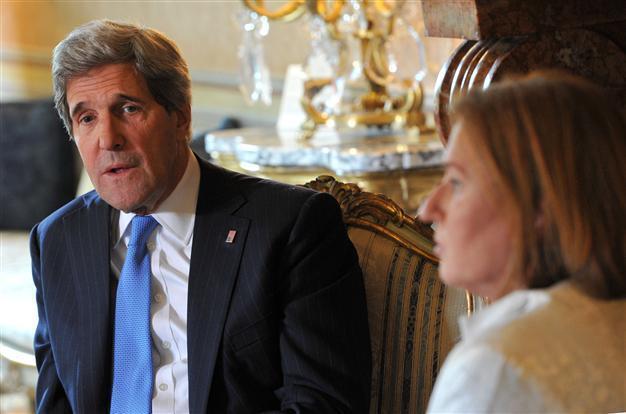Kerry to return to Israel in late May
ROME - Agence France-Presse

US Secretary of State John Kerry (L) talks to Israeli Justice Minister Tzipi Livni during their meeting at the US Ambassador residence in Rome on May 8, 2013. AFP Photo
US Secretary of State John Kerry Wednesday announced he was returning to Israel in late May, as he pursues intensive negotiations to try to kickstart the Israeli-Palestinian peace process.
Speaking at the start of talks with Israeli chief negotiator Tzipi Livni in Rome, Kerry said that all sides "are working through a threshold of questions" with a new "seriousness of purpose." He added he would make his fourth trip back to Israel around "the 21 or 22 of this month" to meet both Israeli Prime Minister Benjamin Netanyahu and Palestinian president Mahmud Abbas.
The new chief US diplomat has made it a top priority to try to bring the Israelis and Palestinians back to the negotiating table, in a bid to resume talks which have stalled since late 2010.
It was Kerry's second meeting with Livni and negotiator Isaac Molho in less than a week, as they sought to continue talks begun in Washington, he said.
All sides were approaching the issues "with a seriousness of purpose that has not been present in a while and we all believe that we are working with a short time span," Kerry told Livni.
Kerry also met last week in Washington with an Arab League delegation seeking to revitalize a decade-old Saudi plan under which 22 Arab nations would make peace with Israel in return for a resolution of the Palestinian issue.
Livni told Kerry she wanted to express "appreciation for all your efforts... after some years of stalemate... your enthusiasm and efforts could change the realities".
"I believe that what you are doing here could create hope in the region, because people somehow lost hope." She also welcomed an Arab League statement last week after the Kerry talks in which they backed moves to resume the peace talks saying there "was a need for support from the Arab states".
